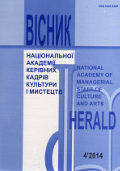ФРАНЦУЗСКАЯ ЛИРИЧЕСКАЯ ОПЕРА СРЕДИ ЖАНРОВ СЕРЬЕЗНОГО ПОПУЛЯРНОГО ТЕАТРА
The French lyrical opera among genres of the serious popular theatre
Author(s): Bo ZhangSubject(s): Anthropology, Theatre, Dance, Performing Arts, Music, Poetry
Published by: Національна академія керівних кадрів культури і мистецтв
Keywords: lyrical opera; serious popular theatre; national tradition; music genre; French music tradition;
Summary/Abstract: The purpose of the given studies is to find out the origin of the lyrical opera genre in European music theatre. The lyrical opera is connected with academic tradition, and popular sphere that allows us to find the parallels with Chinese national art. The guarantee of it is the performance choice and public confession. Chinese singers love to sing the compositions of the lyrical French opera and audience understands them because there is their own line of the lyrical opera Chinese culture such as the Kunqu old-time opera which is well-known in popular cultural sphere at the beginning of the XXI century.In lyrical opera the lyricism is a factor of the melodious hymn way of expression, which has formed the basis of operatic vocalization. Including in French operatic tradition it appeared as the variety of the genre manifestation of the opera (the lyrical tragedy) where music formed scenic syntheses for actions and ideality of the vocal expression. The French operatic tradition formed the opposite school to Italian one and German operatic symphonic style. It was found in J. Duprez vocal-timbre opening, which had made closer the expressiveness of tenor and baritone-bass by means of "baritone character". However, the caution of the using given vocal-timbre innovation in French operatic creative activity later was explained by popular theatre tendencies to simplicity of the forms, including spiritual music.The Spiritual value of the French men’s vocal art opposes the "dramatization" timbre of Verdi and post Verdi periods. In Italian it is entitled the technology "tenors of Verdi" and their analogue in baritone quality. The practice of lyrical-hymn singing united spiritual and public traditions of the vocal culture which were realized in the first French music theatre in the middle of the XIX century.It is not accidentally that the creator the lyrical opera (1859, "Faust") C. Gounod had a spiritual san and wanted to reconstruction of church basis of the expression in opera. There were hymn genre and sublime moral ideas-images. They were personified in music of song-cavatina as corresponding to declarative statement of moral basis strength of being and manifestations nature. The analysis the most significant lyrical "points" of the opera "Faust" shows us that C. Gounod tries to make that music genre closer to applied-home melody, with sample high spiritual lyric poets of old fellows, contributing semantic moral depth and artistic value of the manifestation of life feeling in feature of the personages-image.Gounod-preacher, Gounod-teacher’s social program of supporting the people from social bottom, defined the originality of his artistic program. There he exceedingly united the requirements of high and low, heroic and comic genres, brought the generalising lyrics of the number song-аria features of the main heroes on position of the leading expressive typology of operatic compositions. The given tendency to "simplicity" in operatic drama within serious genre has the analogies with "populism" in Verdi "Traviata" where the waltz base of music and life realism of the characters vestment in modern cloth (the factor of the comic genre) contributed the relationship with "small" genre subspecies of the operatic performance.Don’t forget that the French operetta appeared at the same time with Gounod lyrical opera, but in its music-developed number turned out to the reduction. But it seemed only as a parody of the feathered-vоcаl heights of the expression.A. Dargomyzhskij and other Russian composers turned to simplicity of speech, and its projections in operatic singing, avoiding wealth of symphonic style and vоcаl of arias. The German music as R. Wagner one became firmly es-tablished in redundancy of symphonic style, but in categorical accentuation of declamations and removing ensemble-choral contrast with solo fragment. It simplified the facility of the invoiced decision of the operatic show.So we can make the conclusion about C. Gounod innovation. He worked in resonance with similar other national schools, keeping the national preferences. C. Gounod invented a new genre and named it – a lyrical opera. In French tradition it is connected with Greek-antique stimulus of the artistic process in given national school.Thus, the French lyrical opera formed a new history stage of the finding the opera as music drama where the leading principle is solidarity with folk, national and church origins of this type of art. The lyrical opera finds approximation to simplicity of the forms of the folk music tradition what does not form the prerogative French national music scene. In Chinese practice of the music theatre with dramatic Beijing opera, special role has lyrical Kunqu opera. It has become well-known in world popular cultural space at the end of the XX – at the beginning of the XXI centuries, it notes about rapprochement of different national school in the world.
Journal: Вісник Національної академії керівних кадрів культури і мистецтв
- Issue Year: 2014
- Issue No: 4
- Page Range: 158-163
- Page Count: 6
- Language: Ukrainian

